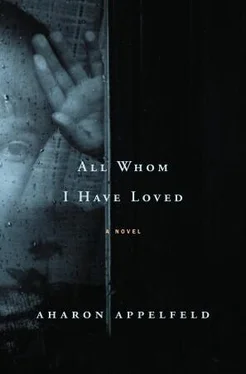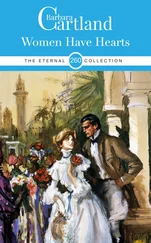We went out to his wagon, and Father helped him load up the provisions. Then he told Kuba about Mother and her illness, and about the long sleep into which she had sunk. Kuba's body seemed to shrink with the bad news, and he closed his eyes. Father said, “I will be here until the doctors draw her out of her deep sleep.”
They stood there, talking, recalling people and places and, of course, the orphanage. Kuba seemed to listen with his entire being, and he kept embracing Father and promising to come and see us. For a long time we stood watching his wagon as it disappeared in the distance. And we were silent, as if something wondrous had befallen us.
We went back to see Mother the next day, and we were astonished. Mother was sitting up, leaning against two heavy pillows, her eyes wide open. Father sank down onto his knees, and I followed him. Mother's face was turned toward us, but her gaze was somewhere else. “Henia,” whispered Father, but Mother did not respond. The elderly monk who was standing next to us and who was a witness to the miracle also sank to his knees. Father pressed both his hands to the floor, as if he were trying to push himself up.
Suddenly, Mother shut her eyes and her face closed. The monk looked at us as if to hint: it's best to leave her; the patient needs complete rest. Father got to his feet, and I did as he did.
“She's feeling better,” said Father.
“True,” said the monk.
“Thank God,” said Father, as if he had borrowed these two words from the monk.
We stood there, looking at her. Her closed eyes seemed to be gazing inside herself.
The monk turned toward the door, and we followed him out. Almost without realizing it, we walked down the long corridor and found ourselves outside.
“She must be better?” Father linked his question to the monk's answer.
Again we circled the monastery. Before we had completed the walk, Father said, “Mother will get better and we'll take her with us to Czernowitz. Her marriage to André was a mistake.” His voice was devoid of anger and rang clear. As if I was in a sweet twilight, I now remembered the apartment that we had lived in together with Mother, with Father sitting on the floor and playing dominos with me.
How many lifetimes had we been through since then? My bond with Father had deepened in the past year. His silence no longer weighed upon me. I could walk with him for two or three hours without exchanging a word and at the end of the walk feel that we'd talked a lot.
We ate lunch at the home of a peasant, who served us corn pie and omelets made with cream that he had just skimmed off sour milk. We were hungry, and we ate with relish. Father paid, and the peasant asked if we were Jews.
“You've got it wrong,” Father rebuked him. “We're Swabian; you can't see that we're Swabian?”
“My mistake,” he apologized.
“You don't see that we're taller than Jews?” Father did not let up.
“You can see it.”
“So how did you make such a mistake?”
“It just seemed to me—”
“Not every person who speaks German is a Jew.”
“You're right, sir.”
I liked Father's charade. When he was in a good mood he entertained, told jokes, and threw in the occasional vulgar word. There were times when he would put on a peas-ant's hat or a merchant's hat, doing imitations and playing entire scenes, and everyone would hang on to every word that came out of his mouth.
So it was then. Father sang, climbed a tree, and imitated the peasant at whose home we had eaten and the innkeeper at whose inn we were spending the night. Most of the time I was afraid of his happiness. After such happiness, darkness would descend upon him, his eyes would narrow, his head would retreat into the collar of his coat, and not a sound would come out of his mouth. But on that day his high spirits did not plummet. He took gulps from his flask, and until late into the night he told me about his childhood in the orphanage and about how he had met Mother.
That night I dreamed that we were traveling on the train, passing stations in the semidarkness. A man who sat next to Father was pestering him with questions. At first Father was polite and answered, but when the man overdid it, Father got to his feet and shouted, “Enough! I don't owe you any answers!” The man was taken aback by Father's tone of voice but continued asking his questions. Father ignored him, but the man did not let up. Father warned him that if he continued to bother him he would hit him, but the man ignored his warning and laughed. That laughter seemed to hurt Father deeply, and he struck the man in the face. Then the man got up and called out, “I've exposed the face of this Jew!”
Father continued to hit the man. His punches, though strong enough, apparently did not hurt him, for the man continued to laugh, as if he wasn't the one being beaten but the one doing the hitting. And indeed he was. I lifted up my eyes: Father's face was covered with blood.
Our life now revolves around the monastery. We come to see Mother at regular times. Sometimes Father falls to his knees and does not stir from that spot for an entire hour. Sometimes Mother opens her eyes and gazes at us, and sometimes a word escapes her. But for the most part she's sunk in her sleep, and we stand by her bed and gaze at her. It's Mother and yet not her. She looks at us but does not see us. Sometimes I feel that she tries to pull us into her sleep. I would go to her willingly, but I do not know how to break through the barrier between wakefulness and sleep. Father seems to know a little about it. I heard him discuss this with one of the monks. An elderly monk heard Father's name and cried out in wonder, “Why, if it isn't Arthur Rosenfeld — the famous painter?!” It turned out that this elderly monk loved painting; he had seen Father's exhibitions, admired them, and bought a small sketch that he hung in his room. He even remembered that one of the critics had called Father the King of the Demons — even then Father frequently painted demons. But Father doesn't usually talk with the monks about painting; they talk, instead, about the mystery of faith. It's hard for me to understand these complicated things, and I stand in awe as Father converses with the monks as an equal. Sometimes he recites poems or passages from the Bible to the admiring monks. Once I heard one of the monks say to him, “You're really one of us. How did you come to live in a world without God?” Father answered him straightforwardly, “There's no man without God,” much to my surprise.
On clear days we venture farther, to the forest or the open fields. Our walks are mainly journeys of silence, but once, Father turned to me and said, “Don't take the path I've taken.” I asked him what he meant. He answered me at length, but I understood nothing of his explanations.
The days pass, and there is a strange order to our life here. Sometimes it seems that this is how it will be from now on, forever. Occasionally, after a visit to the monastery, Father may burst into tears, his whole body trembling. I don't know what to do and I stand next to him like a block of wood.
In the midst of this, Kuba, Father's friend from the orphanage, arrives. He has brought us dried fruit and pear preserves made by his wife. He very much wants us to come visit him in the hills, but Father holds firm. “I cannot leave this place. My duty is to be here right now.” Kuba is a head shorter than Father, his face dark and his eyes sunk in their sockets. When Father talks, Kuba's eyes open very wide and he absorbs the words with them. Father loves that he is here with us, and he constantly gazes at him.
We go into the inn, and Father tells Kuba that here the monks have retained the ancient traditions; they don't eat pork and they bury their dead on the day of their death. Kuba listens but doesn't ask for details. Father goes on drinking and appears to become drunk, for he talks at the top of his voice. Among many things, he tells Kuba about the wonderful people God had put in his path, like the Ruthenian peasant with whom we lodged, who loved Jews more than life itself and who for months refused to take any rent from him because he was a Jew, for Jews are the sons of kings and they're hidden priests and they need to be helped to carry out their hidden purpose in the world. Then he tells Kuba about the amazing Victor, who put a mansion at his disposal and arranged an exhibition for him, ignoring the anti-Semites. He mentions how much Victor loves his fellow men and loves artists, how he fought for their cause with all his might and put his entire wealth at their disposal. “God has put many good angels in my path. He even put Henia in my path, but I didn't know how to look after her and now she's lost to me.”
Читать дальше












